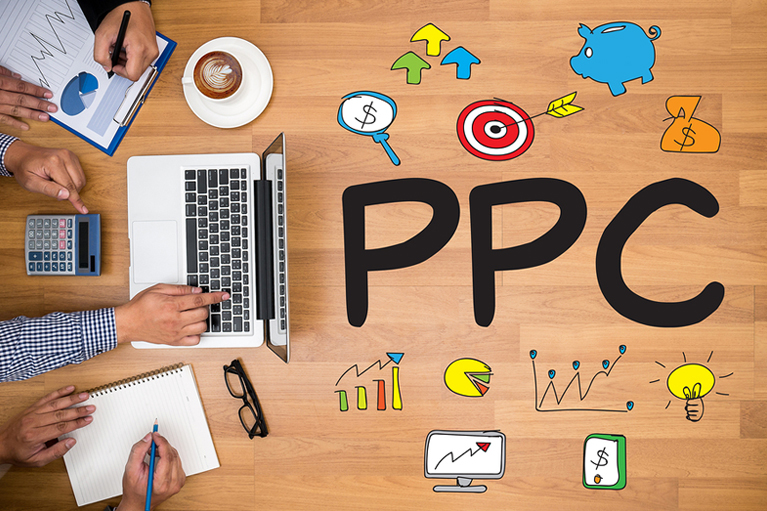PPC Digital Marketing: A Comprehensive Guide to Pay-Per-Click Advertising
Introduction
In the fast-paced world of digital marketing, Pay-Per-Click (PPC) advertising has emerged as one of the most effective strategies for businesses to drive traffic, increase conversions, and boost brand visibility. Whether you are a small business owner or a marketing professional, understanding PPC can help you get the most out of your online advertising efforts.
In this blog, we will explore the ins and outs of PPC marketing, its benefits, best practices, and how you can leverage it to grow your business.

1.What is PPC Advertising?
Pay-Per-Click (PPC) advertising is an online marketing model where advertisers pay a fee each time their ad is clicked. Essentially, it’s a way of buying visits to your website rather than attempting to earn them organically.

2. How PPC Works

- Advertisers Bid on Keywords: Businesses select specific keywords relevant to their products or services.
- Ads Appear in Search Results: When a user searches for those keywords, the search engine (Google, Bing, etc.) displays relevant ads.
- Users Click on Ads: If the ad is compelling, the user clicks on it and lands on the advertiser’s website.
- Advertisers Pay for Clicks: Advertisers are charged based on the number of clicks their ad receives.
3.Benefits of PPC Advertising

1. Instant Visibility and Traffic
Unlike SEO, which takes time to generate results, PPC campaigns can drive traffic immediately after they are launched.
2. Highly Targeted Audience
PPC allows businesses to target users based on demographics, location, interests, and even the time of day they search.
3. Measurable and Scalable
With PPC, every aspect of a campaign—clicks, impressions, conversions—can be tracked and analyzed, making it easier to optimize.
4. Budget Control
Advertisers can set daily budgets and adjust bids based on performance, ensuring they never overspend.
5. Better ROI
When managed effectively, PPC can deliver a high return on investment (ROI) by driving quality traffic to landing pages that convert.
4. Popular PPC Advertising Platforms

1. Google Ads
Google Ads is the most popular PPC platform, allowing businesses to display ads on Google search results and partner sites.
2. Bing Ads
Although less popular than Google, Bing Ads can be cost-effective with less competition and lower CPC (Cost Per Click).
3. Facebook Ads
Facebook’s PPC model enables businesses to run highly targeted ads based on users’ behavior, interests, and demographics.
4. Instagram Ads
As a visually-driven platform, Instagram Ads work well for brands that rely on visual storytelling to capture attention.
5. LinkedIn Ads
For B2B marketing, LinkedIn Ads provide the opportunity to reach decision-makers and industry professionals.
5. Best Practices for PPC Success

1. Conduct Thorough Keyword Research
Choosing the right keywords is crucial for PPC success. Use tools like Google Keyword Planner, Ahrefs, or SEMrush to find relevant keywords.
2. Create Compelling Ad Copy
Your ad copy should be clear, persuasive, and action-oriented. Use power words and highlight unique selling points.
3. Optimize Landing Pages
A well-designed landing page can significantly improve conversion rates. Ensure it:
- Loads quickly
- Has a clear call-to-action (CTA)
- Is mobile-friendly
4. Use Negative Keywords
Negative keywords help filter out irrelevant searches, ensuring your ads are shown only to the right audience.
5. Monitor and Adjust Bids Regularly
To optimize ROI, regularly analyze your bid strategy and adjust spending based on performance data.
6. A/B Testing
Run A/B tests on different ad variations to determine which version performs best.
7. Utilize Retargeting
Retargeting helps bring back users who have previously visited your site but didn’t convert.
6. Common PPC Mistakes to Avoid

- Ignoring Mobile Optimization: Many users search on mobile devices; ensure your ads and landing pages are mobile-friendly.
- Not Tracking Conversions: If you don’t measure conversions, you won’t know if your campaign is profitable.
- Using Broad Match Keywords Excessively: This can lead to wasted ad spend on irrelevant searches.
- Not Utilizing Ad Extensions: Ad extensions (call buttons, site links) improve visibility and CTR (Click-Through Rate).
- Setting and Forgetting Campaigns: PPC requires constant monitoring and adjustments to remain effective. PPC
7. Conclusion
PPC advertising is an essential component of digital marketing, offering businesses a powerful way to drive traffic, generate leads, and increase sales. However, success with PPC requires strategic planning, continuous optimization, and a deep understanding of audience behavior.
By implementing best practices and avoiding common mistakes, you can maximize your PPC efforts and achieve outstanding results. Ready to get started? Try running a small campaign and analyze its performance before scaling up https://en.wikipedia.org/